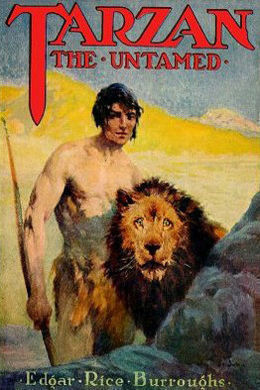
-
EPUB 327 KB
-
Kindle 432 KB
-
Support epubBooks by making a small $2.99 PayPal donation purchase.
Description
Edgar Rice Burroughs’ legendary Tarzan stories continue with two of his greatest! In Tarzan the Untamed, Tarzan defends his jungle home from invaders during World War I and then must protect an Englishman and a German spy from a lost civilization of lion-men! And in Tarzan the Terrible, the lord of the apes embarks on a desperate search for his wife Jane, captured by Germans–and discovers a hidden land where strange dinosaurs and beast-men roam the earth!
434 pages with a reading time of ~6.75 hours (108508 words), and first published in 1920. This DRM-Free edition published by epubBooks, 2010.
Community Reviews
There are currently no other reviews for this book.
Excerpt
Hauptmann Fritz Schneider trudged wearily through the somber aisles of the dark forest. Sweat rolled down his bullet head and stood upon his heavy jowls and bull neck. His lieutenant marched beside him while Underlieutenant von Goss brought up the rear, following with a handful of askaris the tired and all but exhausted porters whom the black soldiers, following the example of their white officer, encouraged with the sharp points of bayonets and the metal–shod butts of rifles. There were no porters within reach of Hauptmann Schneider so he vented his Prussian spleen upon the askaris nearest at hand, yet with greater circumspection since these men bore loaded rifles—and the three white men were alone with them in the heart of Africa. Ahead of the hauptmann marched half his company, behind him the other half—thus were the dangers of the savage jungle minimized for the German captain. At the forefront of the column staggered two naked savages fastened to each other by a neck chain. These were the native guides impressed into the service of Kultur and upon their poor, bruised bodies Kultur’s brand was revealed in divers cruel wounds and bruises. Thus even in darkest Africa was the light of German civilization commencing to reflect itself upon the undeserving natives just as at the same period, the fall of 1914, it was shedding its glorious effulgence upon benighted Belgium. It is true that the guides had led the party astray; but this is the way of most African guides. Nor did it matter that ignorance rather than evil intent had been the cause of their failure. It was enough for Hauptmann Fritz Schneider to know that he was lost in the African wilderness and that he had at hand human beings less powerful than he who could be made to suffer by torture. That he did not kill them outright was partially due to a faint hope that they might eventually prove the means of extricating him from his difficulties and partially that so long as they lived they might still be made to suffer. The poor creatures, hoping that chance might lead them at last upon the right trail, insisted that they knew the way and so led on through a dismal forest along a winding game trail trodden deep by the feet of countless generations of the savage denizens of the jungle. Here Tantor, the elephant, took his long way from dust wallow to water. Here Buto, the rhinoceros, blundered blindly in his solitary majesty, while by night the great cats paced silently upon their padded feet beneath the dense canopy of overreaching trees toward the broad plain beyond, where they found their best hunting. It was at the edge of this plain which came suddenly and unexpectedly before the eyes of the guides that their sad hearts beat with renewed hope. Here the hauptmann drew a deep sigh of relief, for after days of hopeless wandering through almost impenetrable jungle the broad vista of waving grasses dotted here and there with open park like woods and in the far distance the winding line of green shrubbery that denoted a river appeared to the European a veritable heaven. The Hun smiled in his relief, passed a cheery word with his lieutenant, and then scanned the broad plain with his field glasses. Back and forth they swept across the rolling land until at last they came to rest upon a point near the center of the landscape and close to the green–fringed contours of the river. “We are in luck,” said Schneider to his companions. “Do you see it?” The lieutenant, who was also gazing through his own glasses, finally brought them to rest upon the same spot that had held the attention of his superior. “Yes,” he said, “an English farm. It must be Greystoke’s, for there is none other in this part of British East Africa. God is with us, Herr Captain.” “We have come upon the English schweinhund long before he can have learned that his country is at war with ours,” replied Schneider. “Let him be the first to feel the iron hand of Germany.” “Let us hope that he is at home,” said the lieutenant, “that we may take him with us when we report to Kraut at Nairobi. It will go well indeed with Herr Hauptmann Fritz Schneider if he brings in the famous Tarzan of the Apes as a prisoner of war.” Schneider smiled and puffed out his chest. “You are right, my friend,” he said, “it will go well with both of us; but I shall have to travel far to catch General Kraut before he reaches Mombasa. These English pigs with their contemptible army will make good time to the Indian Ocean.” It was in a better frame of mind that the small force set out across the open country toward the trim and well–kept farm buildings of John Clayton, Lord Greystoke; but disappointment was to be their lot since neither Tarzan of the Apes nor his son was at home.
